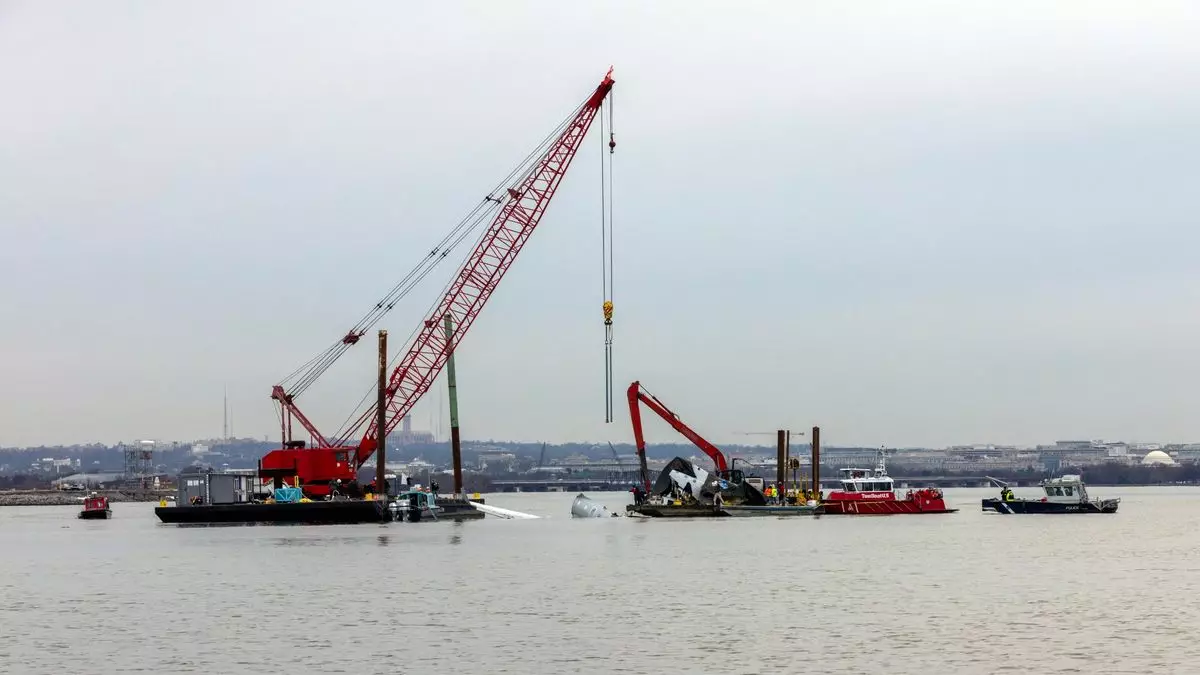The National Transportation Safety Board (NTSB) has long been recognized as a beacon of integrity in the realm of air accident investigations. Its meticulous approach and dedication to uncovering the facts behind aviation disasters have earned it the status of a “gold standard” agency in the eyes of many institutionalists. However, with the recent tragic collision involving an American Airlines regional jet and an Army Black Hawk helicopter, this esteemed agency finds itself navigating a turbulent political landscape. President Trump’s premature speculation regarding the cause of the January 29 incident poses significant concerns about the ramifications for the NTSB’s independence and effectiveness.
Political observers have raised alarms about the potential impact of Trump’s comments, suggesting that his attempt to ascribe blame to diversity initiatives without concrete evidence places undue pressure on the investigative process. Mark Jones, a political science expert at Rice University, articulates a key point: the politicization of such incidents may inadvertently influence NTSB operations. When a sitting president inserts himself into an ongoing investigation with unsubstantiated claims, it complicates the agency’s ability to conduct an independent and objective inquiry. Jones warns that this could lead to NTSB feeling compelled to explore avenues dictated by political narratives rather than integrity-driven analysis.
The collision resulted in the tragic loss of 67 lives, making it a critical incident that necessitates a thorough investigation. However, Trump’s comments, which implied that the effectiveness of air traffic controllers was compromised by diversity, equity, and inclusion (DEI) initiatives, not only lack empirical grounding but also undermine the careful and nuanced nature of the investigative work the NTSB is tasked with. The president’s assertion raises questions about the balance between political discourse and the safety of air travel. If the investigations are swayed by political considerations, the integrity of the findings may be irrevocably tarnished.
In addressing the fallout from the incident, safety advocates express concern over how the NTSB’s accountability might be affected. David Clark, a political science professor at Vanderbilt University, highlights the potential for conflict between presidential narratives and the agency’s conclusions. If the NTSB’s final report contradicts the president’s statements, there could be dire consequences, including potential scrutiny of the agency’s budget or even direct political repercussions for its leaders. The intersection of governance and agency performance becomes fraught with complications when political figures blur the lines of investigative independence.
Despite the unexpected involvement of the highest office in the land, the NTSB has publicly reaffirmed its commitment to an evidence-based investigation. Figuring prominently in these efforts is board member J. Todd Inman, who stressed the board’s dedication to uncovering the truth through factual and accurate means. The resolve to maintain objectivity in the face of political distractions will undoubtedly be put to the test as investigations unfold.
Furthermore, Jennifer Homendy, the NTSB chair, offered an indirect yet pointed response to inquiries about political interference, emphasizing that the media also often speculate on causes prior to official findings. Her comments suggest an awareness of the pressures on the agency from various fronts, further complicating their ability to maintain the integrity of their work.
Yet, there are voices from within the NTSB that have openly criticized the politicization of the investigative process. Former NTSB managing director Peter Goelz articulated this concern vividly, describing Trump’s rapid commentary as “appalling.” He posits that the reputation and effectiveness of the NTSB, cultivated over decades, hang in the balance when political discourse infringes upon established investigative norms. His comments serve as a reminder that the credibility of the American safety system is predicated on transparent and unbiased investigations.
The events following this tragic crash illuminate the delicate interplay between political influence and independent agency work. For the NTSB to retain its status as a trusted institution, it must navigate the pressures and expectations placed upon it by external forces carefully. As political analysts have pointed out, finding the right balance between accountability to the public and safeguarding the integrity of investigations is paramount.
Moving forward, stakeholders within the aviation community must advocate for the separation of political rhetoric from the critical work conducted by agencies like the NTSB. Ensuring that investigations remain grounded in facts and evidence rather than swayed by political narratives will restore faith in the system purported to uphold air safety. As the NTSB continues its work, the focus must remain entrenched in an unwavering commitment to transparency, objectivity, and truth—a mandate essential for rebuilding public trust and maintaining the agency’s esteemed reputation.

